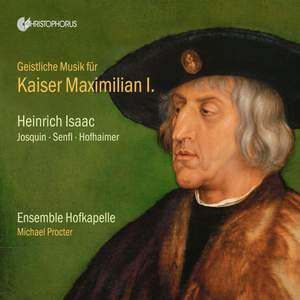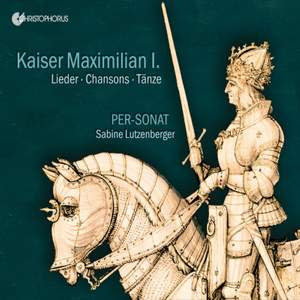Program: #20-24 Air Date: Jun 01, 2020
To listen to this show, you must first LOG IN. If you have already logged in, but you are still seeing this message, please SUBSCRIBE or UPGRADE your subscriber level today.
The Christophorus label gives us three CDs showcasing the lively musical scene at the court of the Holy Roman Emperor Maximilian I.
NOTE: All of the music on this program is from recordings on the Christophorus label released for the 500th anniversary commemoration of the passing of Emperor Maximilian I in 1519.
I & III. Sacred Music for Kaiser Maximilian I (Ensemble Hofkapelle/Michael Proctor). Christophorus CD CHR 77439.

The program on the first CD presents motets by Isaac, Senfl and Josquin which are written for different sacred occasions at the Maximilian Court.
The second CD presents two Marian Masses composed for Maximilian by Isaac. The first one is set for four voices and Maximilian must have liked it very much because he tasked Isaac to revise it into a six voice mass.
The Ensemble Hofkapelle present these two masses in alternation first with Gregorian chant and the second mass with organ improvisations in the style of Paul Hofhaimer, Maximilian’s famous court organist.
Isaac: Motets for Kaiser Maximilian I
Salve Regina
Innsbruck, ich muss dich lassen
Inviolata, integra et casta es Maria
Quis dabit oculis
De profundis
Christ ist erstanden
Proch dolor
Inviolata integra et castra es, Maria
Christus surrexit
Virgo prudentissima
Salve sancta parens enixa
Sancti spiritus assis
Isaac: Virgo Prudentissima
Missa, 'Virgo prudentissima'
Virgo prudentissima
Virgo prudentissima
Optime pastor
A la Battaglia
III. Kaiser Maximilian I: Lieder, Chansons, Tänze (Per Sonat Ensemble/Sabine Lutzenberger). Christophorus CD CHR 77438

Maximilian, who was crowned Emperor of the Holy Roman Empire in 1508, was a great patron of the arts in addition to his warlike activities. Here the music was in his special interest and he brought the most important musicians of his time to his court: Heinrich Isaac, Josquin des Pres, Paul Hofhaimer and Johannes Ockeghem. The artistic sacred music for Emperor Maximilian has already been widely published.
The ensemble Per-Sonat, directed by Sabine Lutzenberger, consists exclusively of leading heads of the early music scene and now turns to secular music at Maximilian’s court: the songs, chansons and dances that document the emperor's love of music in a new way.
Ensemble Per-Sonat and their director Sabine Lutzenberger have put together a varied recital of musical miniatures that combines dances, love songs and secular chansons to give a vivid picture of the daily life of Maximilian’s court, where music might be after-dinner entertainment, seduction tool or accompaniment to dancing. Ockeghem’s hugely popular love song ‘D’ung aultre amer’ is heard first in its elegant, mercurial original, then in one of many anonymous arrangements – crisper and more playful than Lutzenberger’s own yearning solo account. What emerges most strongly here is the sense of music on a cusp. Many of the modal dances, with their primitive twoor three-part counterpoint, look back to earlier decades, while in the sophisticated works by Heinrich Isaac and Ludwig Senfl (whose exquisite love songs, particularly the former’s ‘Kein frewd hab ich uff erd’ and the latter’s ‘Kein Freud’ ohn’ dich’, are a highlight) anticipate the musical future.
Touchingly, the programme closes with the brooding, sober beauty of Josquin’s ‘Proch dolor/Pie Jesu’, whose text mourns the death of an emperor – probably Maximilian himself. Two texts and three voices are tightly woven into a canonic path from which there is no deviating – a metaphor that needs no explanation.
The joy of this release is in the detail: the close recording that brings out the grit and gasp of the period strings, their rich colours illuminated against the white purity of the voices, the many stories of unlikely or curious provenance that emerge in the booklet notes.
2 Engoulesme - Anonym 0:52
3 Zwischen perg und tieffe tal - Heinrich Isaac 0:51
4 La basse danse de Cleves - Anonym 0:41
5 D’ung aultre amer - Johannes Ockeghem; Anonym 0:50
6 Kein frewd hab ich uff erd - Heinrich Isaac 1:11
7 La basse danse du roy d‘Espaigne - Anonym 0:55
8 Kein Adler in der Welt so schön - Adrian Willaert 1:07
9 D’ung aultre amer / Dun uatre mer - Anonym 1:32
10 Kein Freud’ ohn‘ dich - Ludwig Senfl 0:58
11 La douce amour - Anonym 0:55
12 O pulcherrima mulierum - Antoine de Févin 1:03
13 La Portingaloise - Anonym 0:53
14 Mein Freud allein in aller Welt - Heinrich Isaac 1:33
15 La Margerite - Anonym 1:18
16 Ach lieb mit laid - Paul Hofhaimer / Hans Neusidler 2:14
17 Proch dolor/Pie Jesu - Josquin Des Prez 0:50
Composer Info
Paul Hofhaimer, Heinrich Isaac, Josquin des Pres, Johannes Ockeghem, Ludwig Senfl. Adrian Willaert, Antoine de Févin, Hans Neusidler
CD Info
Christophorus CD CHR 77439, Christophorus CD CHR 77438